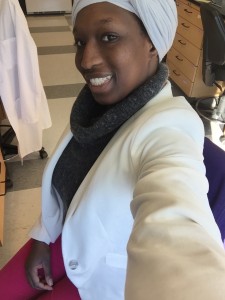Hello everyone! My name is Fatu Badiane Markey and I am very excited about blogging for iJOBS at Rutgers University. Before we get into the more serious articles, let me tell you a little bit about myself. As an undergraduate, I majored in Biology with a concentration in Neural and Behavioral studies at Bryn Mawr College. At that time, I was interested in pursuing a career in medicine. My goal at that point was to become a neurologist, or neurosurgeon. I took pre-med classes as part of my course work and even prepared to take the MCAT. I conducted my senior thesis research in the laboratory of Dr. Karen Greif examining the role of synaptotagmin in neurite outgrowth. After graduation, I accepted a position as a laboratory technician at Thomas Jefferson University under the guidance of Dr. D. Craig Hooper. In Dr. Hooper’s lab I learned basic virology, immunology, and animal work. His research focused on understanding blood brain barrier permeability using several strains of rabies virus as a model for permeability. While working, I decided to pursue a master’s degree at Jefferson, solidifying my decision to start a career in science as opposed to medicine. As a master’s student, my thesis project in the lab of Dr. Bernhard Deitzschold studied how targeting microtubule associated protein light chain 3B (LC3B) in the autophagy pathway could lead to improved antigen presentation. If successful, this project would be further expanded into making improved vaccines. I realized at this stage that there is a nice intersection between medicine and science within the career of research. Although I may not see patients directly, or necessarily treat anyone, I can still be involved in the process of inventing new preventative or diagnostic tools. Currently, as a doctoral student in the lab of Dr. Mona Batish at Rutgers University, we are working to improve upon currently available cancer diagnostic techniques, specifically with regard to soft and solid tissue tumors that have limited diagnostic options. My first publication focused on the use of single molecule fluorescence in situ hybridization (smFISH) methods to detect unique, downstream mRNA products of specific chromosomal abnormalities associated with different cancers. We were able to show the success of this technique in identifying the fusion transcripts of BCR-ABL in Chronic Myeloid Leukemia (CML) and EWS-FLI1 in Ewing’s Sarcoma. Expanding on initial work, my thesis research focuses on understanding the biological mechanisms of Ewing’s Sarcoma, a pediatric bone and soft tissue tumor. Little is understood regarding the mechanisms of several key transcription factors in this disease. I hope that my research will be able to shed light on these major knowledge gaps and possibly lead to viable therapeutic targets. My initial career goals were just as varied as my research experience – from medicine to diagnostics to basic biology – I have an interest in it all. However, through the various sessions of the iJOBS program, I have discovered a great interest in the world of science and health policy. I recently started Phase 2 of the iJOBS program and I am optimistic that the skills I learn as part of this program will get me to where I want to go. Apart from the hours I spend in the lab, I live very happily in Pennsylvania with my dorky husband. I enjoy listening to audiobooks and podcasts, playing Xbox with friends, discovering new places and foods, and knitting. 


iJOBS Blog